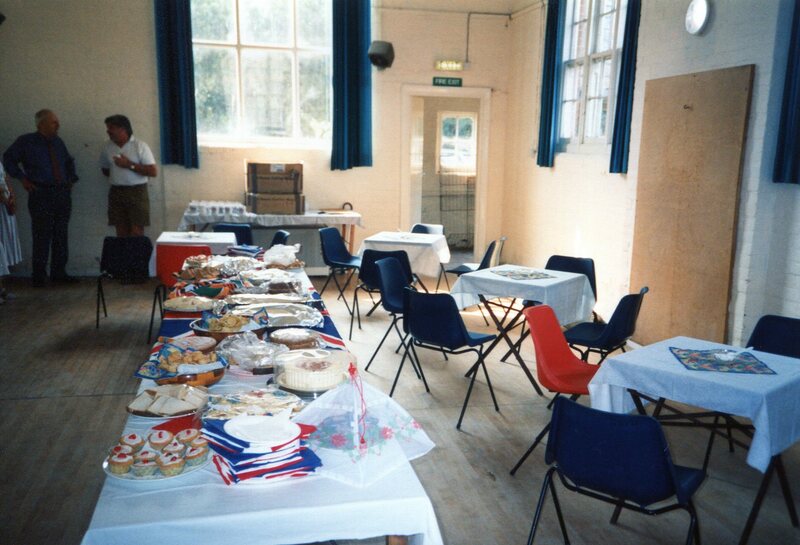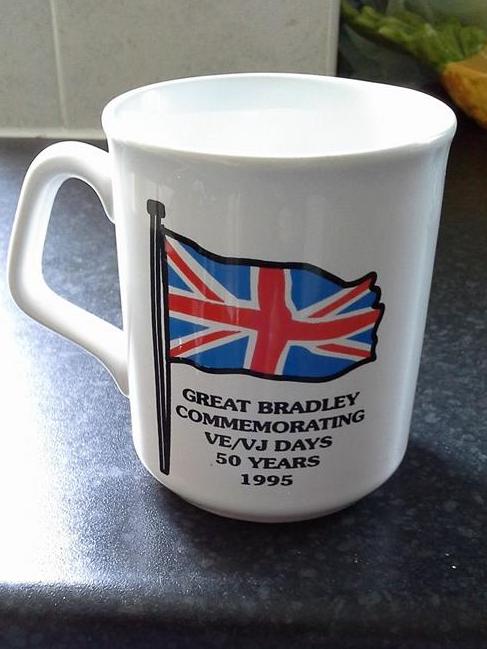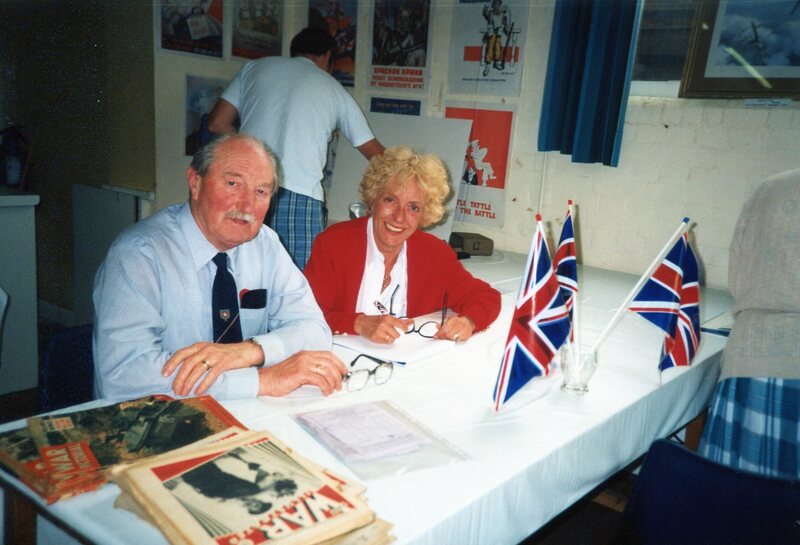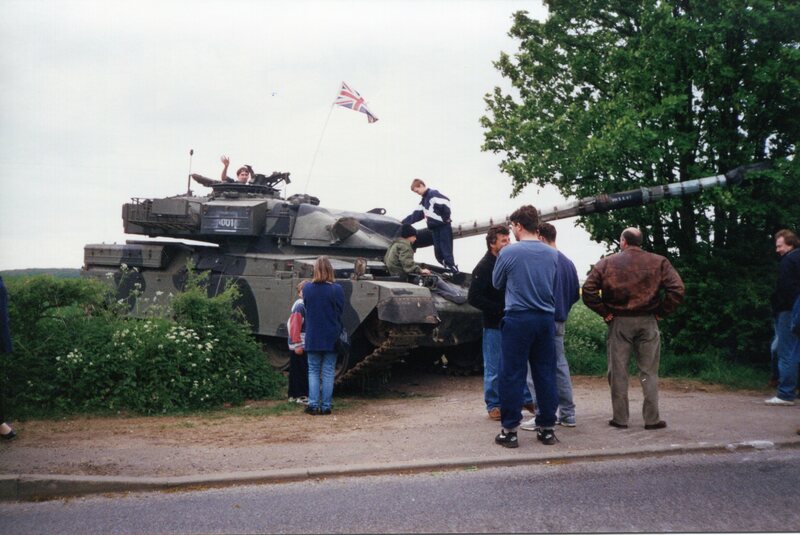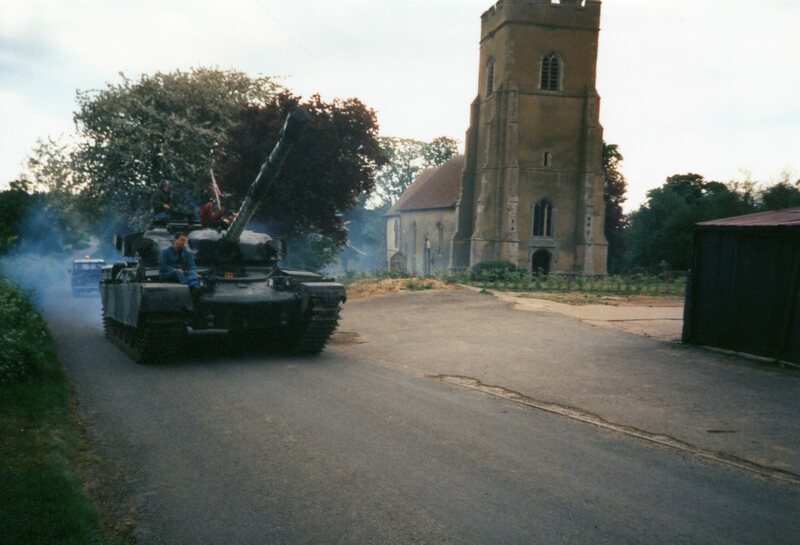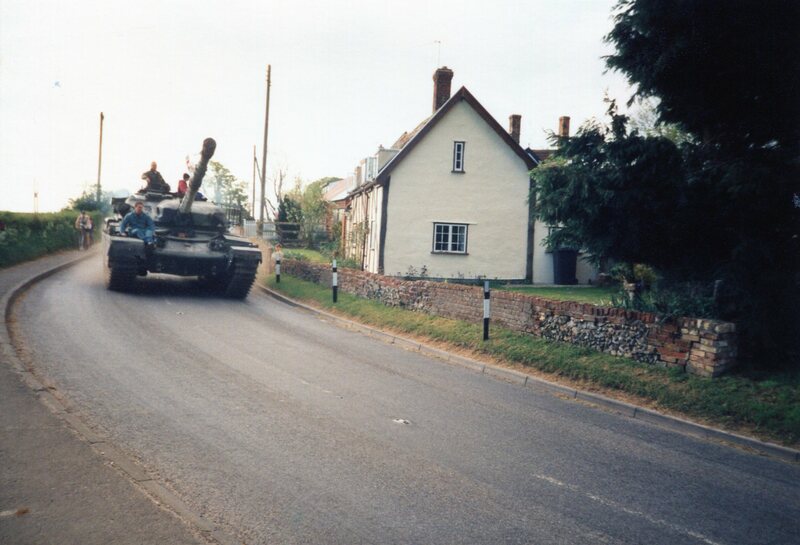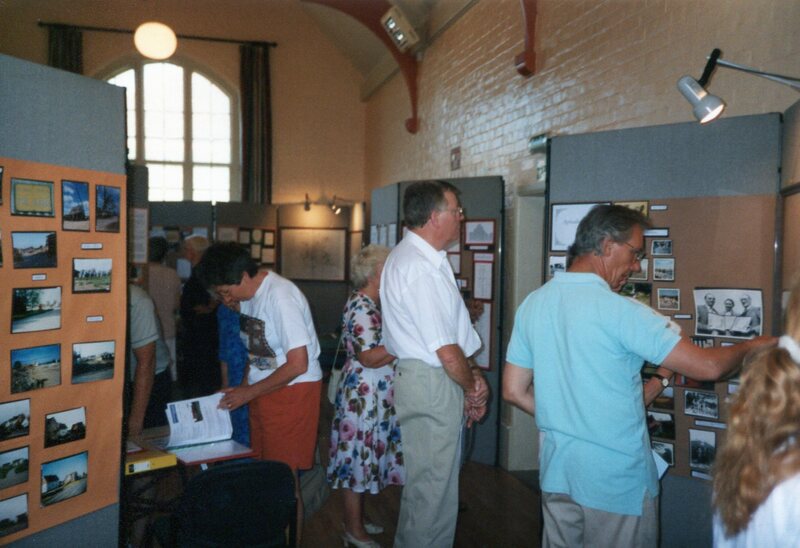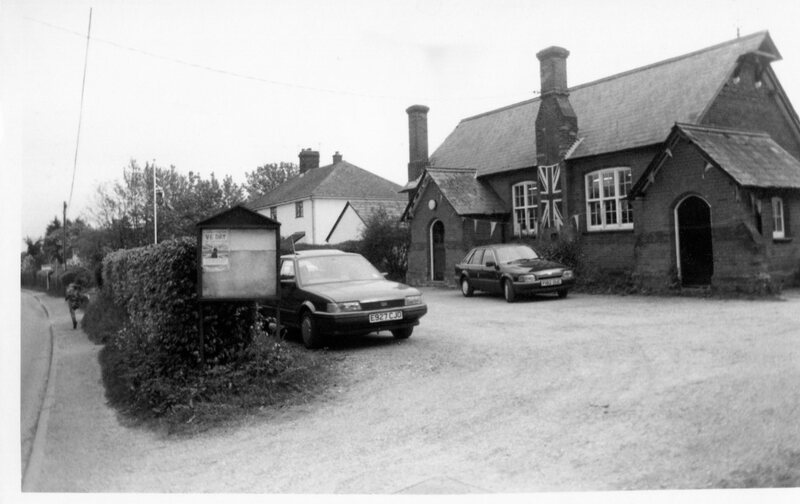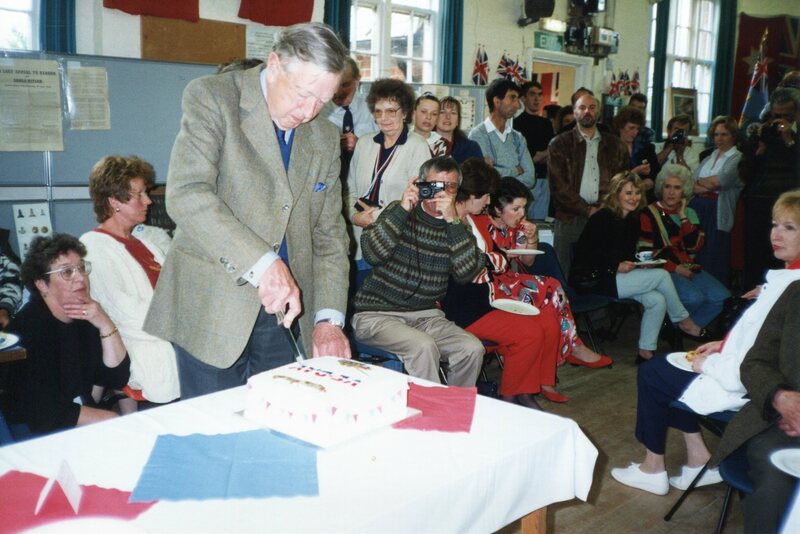1995 - Commemoration of 50 Years since VE Day
Great Bradley Residents held an exhibition in the village hall to commemorate 50 years since the end of WWII. Here are some of their World War II memories
These recollection of residents of Great Bradley were collated for a celebration of 50 years of VE Day in the village in 1995
THE LONGEST YEARS
Mrs Agnes Beavis (nee Potter) met her husband, Reg, when she was 17 and living with her parents at Thurlow Road, Great Bradley, and he was 25. Reg's father and mother ran the Cock Inn at Hundon before the War, but the pub was demolished to make way for the runway at Stradishall Aerodrome. Reg was called up to join the Armed Forces on 6 June 1940 and they decided to become engaged, by which time Aggie was 18 years old. Reg had notification that he was to be drafted overseas on 6 October 1940 and was given ten days' embarkation leave in. preparation. Neither Reg nor Aggie knew that it would be almost three-and-a-half years before they would meet again. Reg served in the 8th Army and took part in the Western Desert campaign and the recapture of Tobruk, followed by the invasion of Italy through Sicily. During these long years, Aggie and Reg wrote to each other five times a week and finally met again in February 1944 when he was allowed ten days' leave. They were married on 23 February 1944. Aggie managed to buy her wedding dress in Cambridge with precious clothing coupons. She had the choice of two dresses - both identical styles, each of the same material, but one with the shiny side outwards and the other with me shiny side inwards. She chose the former, which was on display at the Exhibition. It was too long but there was no time to have it shortened. She borrowed a headdress and the bridal gown was afterwards loaned to three other brides in the area. Aggie and Reg spent their honeymoon with Reg's parents who, by this time, were running another public house in Soham.
Reg then took part in the D-Day landings in Normandy on 6 June 1944 and made his way through France with the allied forces. After the War ended, he was awarded the African Star. He was notified that he could also claim the Bar to the African Star but maintained that if it could not be sent to him as a matter of course. then he had no particular wish to go through the bureaucratic channels of making a claim. Several of Reg's medals were also on display. Afterwards, Aggie and Reg lived in Prospect Villas, Great Bradley, followed by 24 years at Crown House (formerly the Crown public house owned by Greene King), where Aggie ran the post office and petrol pumps and Reg was a builder and decorator. They retired to Clarendale in September 1976. Reg died in October 1982.
ACROSS THE CHANNEL - Dennis's Story
Dennis Low, previously of Wanstead, and his wife, Clarice (nee Elvish), of Leytonstone, first met in 1940 when they were both seventeen years old. Dennis and Clarice now live at Clarendale, and both made a significant contribution to the Exhibition, particularly as Dennis kept a photographic record throughout the War years. Dennis was called up on 20th August 1942 and became Leading Aircraftsman (LAC) with the Airforce Regiment, formed in 1942. To use Dennis's words, this meant "you were trained in everything." Throughout the next year, Dennis saw more of the British Isles than he had yet seen in his young life - Padgate, Blackpool, Isle of Man, Feltwell, Filey, Towyn, Romney Marshes, Spean Bridge, Salisbury Plain - drill instruction, marching, using rifles on parade, using terrain to best advantage, arms proficiency (live hand grenades, rifles, revolvers, machine guns), air raid defence, anti-aircraft guns (at Filey, ex-Butlins Holiday Camp), and firing at drogues towed by light aircraft. During the very hot summer of 1943, on the Romney Marshes, where patterned metal was used as runway, he saw between 150 and 200 Spitfires flying out on sorties every day over France and Belgium although, at this point, Dennis had not seen any enemy action. In January 1944, Dennis took part in a Commando training course on rugged, mountainous terrain in Scotland. He then moved down to Salisbury Plain, where his revisional training continued until April 1944 and he was given ten days' leave. By this time, he knew mat INVASION was planned. Asked how he knew, Dennis said that when his leave ended he was moved to Gosport in late May; the camp was in a wood surrounded by barbed wire where there was no contact with the outside world and everyone was issued with French currency.
Thousands of men left the camp and were then parked m the side streets of Gosport. The men were allowed to scribble OK notes to their families but no mention was allowed to be made of the location. Tea and biscuits were handed to the troops by people living in the nearby houses and the lorries moved on to the dock area of Gosport. Dennis embarked at 4 o'clock that afternoon on a Landing Craft Tank (LCT) and slept on ammunition on the back of the lorries. They stopped at sea and moved off again just before dusk. Asked if he was at all afraid during this time, Dennis said, "Yes, we were all afraid. I just prayed for God to let me live. I was nineteen years old. But, once we had landed, it all became a part of our lives. I remember one of the soldiers waving a telegram joyfully upon embarkation because he had been notified that he had just become a father. He was killed on the beach when we landed.
We landed on Gold Beach, Arromanches, at 7.25 am with the 50th Northumbrian Division. Units of the 42nd Commandos landed at the same time and the Canadians were already on Juno Beach. There was an incredible noise from the covering fire of battleships, destroyers and cruisers, with the beach being strafed by enemy heavy machine guns. We just kept going, running up the beach. There were heavy casualties, maybe between 1,500 and 2,000 men. We gathered together in some sort of formation, moving inland. On the next beach, Omaha, we heard later that there were three to four thousand killed, all Americans.
France
The first village we came to was Le Fresne Camffly. There was an old lady sitting outside a cottage, staring because she couldn't believe her eyes. The first town we entered was Bayeux. In the village of Bray, we spent 6 hours in a ditch. We went through villages that were totally devastated - I remember the carpets and lino lying around. Then there was the battle of Caen, where we broke out at Falaise Gap and the German 7th Army was destroyed. There were about 200,000 dead and 450,000 were taken prisoner. The Germans shouted out, "The War's over, now we're going to your country."
Belgium
The battle of Normandy was the biggest of all time, though we didn't realise it at the time. We progressed through France and were into Belgium in no time. When we liberated Brussels it was a beautiful day. There were incredible crowds in the main streets but the side streets were empty. The girls pinched our cap badges and we were thrown bunches of grapes. I remember people sitting at ice-cream parlours. I'd not seen either grapes or ice-cream since the War started. After three or four hours, we stopped at Imber by meadows in the countryside and the CO came along and announced seven days' rest, the first time since we'd landed. We put up the tents and were told to have a bath, shave, and get out our best uniforms from the kitbags for a night out. We were allowed to use me lorries for transport back to
Brussels and there were thousands of people grabbing soldiers to take them out. I was taken by the manager of the Bank of Brussels, together with his wife and daughters, to a nightclub where there was a band. Every woman wanted to kiss you. A friend said, "It's the first time we've ever had to fight them offl" It was the same sort of reception at Amiens where my father had fought during me First World War.
Holland
We reached Holland in late August and, in mid-September, we saw aircraft full of paratroopers towing gliders for the Arnhem drop although we did not witness the drop. I was part of the flying column which was formed to try and gel through to Nijmegen to get the troops out, but we could get no further than the bridge; we were unable to cross. At Zeelst, near Eindhoven, on New Year's Day 1945 (it was a bitterly cold winter), the Germans put their Air Force in the air using petrol captured in the Ardennes. We were heavily strafed and lost many planes destroyed on me ground.
Germany
We crossed the Rhein at Xanten with the 15th Scottish Division on 24 April under heavy fire although resistance was not as fierce as expected, but the 51st Highland Division had heavy casualties at Wesel. We were in Hamburg when the War ended and went through places like Liibbecke, Bremen, Kiel and Hanover. Field Marshall Montgomery had his HQ at Blickeburg and sixteen of us were sent to his residence, a farmhouse outside the town. This was an easy job as well as being a great honour. I was there from early June until mid September 1945 as one of Mongtomery's personal guards. I then went to Berlin to Gatow Airfield where I was given the job of being in charge of the post for our Unit. I was offered promotion to Flight Sergeant to sign on for three years but I refused and was demobbed on the 18th November 1946."
THIS SIDE OF THE CHANNEL - Clarice's story
"I joined the ATS as a volunteer in April 1943 after three weeks training at Glenparva Barracks, Leicester, and was sent to my unit in Bicester, Oxfordshire. After passing written and practical exams for a DR (despatch rider) I was informed that five other girls and I would have to re-apply as there were sufficient DRs at that time. Of course, like everything else, once they had you in their clutches doing more important jobs in the RAOC, it was a waste of time re-applying. However, I thoroughly enjoyed my 2 years in the ATS and felt the job I was doing, which was preparing spare parts for tanks and guns for the fighting men, was rather important
Den and I exchanged cards and letters all through the War. On one occasion when annual leave was stopped for everyone, I knew more or less that something serious was going to happen for Dennis as he sent a wire to say he would be on leave. I felt I had to see him before he went away - I loved him so much, you see. I broke through our camp at midnight and walked 8 miles to the station. I had a forged pass mat one of my male friends had made for me in case I was stopped. It was very eerie and I felt extremely frightened; I kept thinking someone was following - it was a very lonely place in the country and, being pitch dark, the trees made strange noises and I walked backwards some of the way. I arrived at Bicester station at 8.00 am and had to wait till 9.00 am for a train. The station master, who was very sweet, lit a fire for me in the waiting room. I was quite nervous when I arrived on Paddington station in case I was stopped by MPs (military police). I still cannot believe how lucky I was not to be stopped as I passed three groups of MPs and managed to give them all just a light-hearted smile although I was shaking in my shoes. I carried on with my journey to Wanstead and managed 5 days' leave with my dear Den before I was sent a telegram to go back to camp. I had one week's pay stopped and one week's CB (confined to barracks) but it was worth every minute."
CHILDHOOD MEMORIES
Margaret Hearn and her father. Bill Wilsher, formerly of Fox Farm House, and then moved to Haverhill. Bill was in the Army (Pioneer Corps) during the War and was posted to various barracks within the UK. Among the items in the Exhibition were his original boots which had been used for gardening over the post-war years but were presented in pristine condition for the display. Margaret was 7 or 8 years old at the time and has retained many memories other father at War. Bill was a non-smoker and often exchanged his tobacco ration for sweets which he brought home for his two daughters - a devoted father, as Bill himself had a sweet tooth! Whilst in Cornwall, Bill became friendly with a farmer and obtained a regular supply of eggs. He tried with varying degrees of success to post them home to London-, but Margaret remembers having them mostly in scrambled form. Margaret has a clear memory of always seeing her father off from the station after leave. On one occasion they were late and the train was packed full. She remembers her father being pushed head first through the window and the train pulling away with his legs and boots (yes, the same boots) still outside the train. Margaret regularly wrote to her father whilst he was away, and he has kept many of these letters to this day. Several were on display at the Exhibition. A fervent believer in fairies, Margaret still has her letters (kept by her mother) sent to the fairies to help end the War so her Daddy could stay at home. A follow-up letter asked the fairies why they had not answered her first letter and why the War was still going on!
VICTORY & PEACE IN 1945
From the Diary of Mr A J (Jack) Chapman. Jack kept the Post Office (now Willow Cottage)
May 5th. 1945 - News Chronicle headline: 'Monty's Job Done: War over in N.W. Germany, Holland, Denmark. Cease-fire at Sam. No word yet of Norway: Greatest German Surrender since November 1918: "Haw-Haw" fled by car to Denmark.' This evening wireless news is very good - many more lay down arms.
May 6th 1945. Sunday - News of the World headlines - "Norway is the Problem Now: Nazis call Surrender a Truce: Fighting the Bolshevik Terror: German Shells on Copenhagen: Monty tell of Surrender Drama'
May 7th 1945. Monday - Very warm - a lovely day. In the evening, Peter Surridge came, and was with me when our Church bells rang out the Victory Peals at 10.38 pm. There was also a fire at Waterfield Barn - it's still burning at time of writing this - 11.40 pm. Mr Clem Smith came and heard the great news which stated that tomorrow is V-Day. Mr Churchill will speak at 3 pm tomorrow, and H M The King will broadcast at 9 pm. I have just come in from looking about outside - all around flares of all colours are dropping with searchlights beaming about the sky. This is the best news I have entered in this Diary. That the War in Europe is officially ended today. We must thank the Almighty God for this great day.
May 8th 1945. Tuesday - Weather fine and bright. Today and tomorrow are National holidays. Percy Mills brought me a Union Jack on a stick. [After hearing Churchill and the King on the wireless] I went into Church Field where Mr & Mrs Custerson had a bonfire. I took 4 Thunderflashes & let them off there. I stayed up until 2 am & listen to the wireless and then to bed. During the night bonfires & rockets & fireworks could be seen going up all around- it was a very pretty sight. There seems to be a huge fire over Clare way. Well, this is the day everyone living has been longing for. What a day. Peace at last, so we must thank Almighty God for our safe deliverance from this terrible ordeal we have all been through for nearly six years. The One Thousand Guineas at Newmarket was won by Sun Stream (H Wragg) 5-2 fav. Blue Smoke (F Smith) 25-1, Mrs Feathers (A Wragg) 4-1, 14 ran.
May 9th 1945 Wednesday - Just before dinner, I went to Mr Percy Mills' house with 15 Thunderflashes, and Mr J Dixon below the Hill also took 15 Thunderflashes. Mr Charles Mills came and took 30 Flashes - he is leaving 15 Thunderflashes at Mr Jack Felton's house. Mr Charles Mills told me this afternoon that he went down and rang out our Victory Bells at the Church at 10.38 am.
The pictures below are from the 1995 event. Click the pictures to see a larger image - including the Chieftan tank that didint quite make it from East Green to the Village Hall before breaking down!
These recollection of residents of Great Bradley were collated for a celebration of 50 years of VE Day in the village in 1995
THE LONGEST YEARS
Mrs Agnes Beavis (nee Potter) met her husband, Reg, when she was 17 and living with her parents at Thurlow Road, Great Bradley, and he was 25. Reg's father and mother ran the Cock Inn at Hundon before the War, but the pub was demolished to make way for the runway at Stradishall Aerodrome. Reg was called up to join the Armed Forces on 6 June 1940 and they decided to become engaged, by which time Aggie was 18 years old. Reg had notification that he was to be drafted overseas on 6 October 1940 and was given ten days' embarkation leave in. preparation. Neither Reg nor Aggie knew that it would be almost three-and-a-half years before they would meet again. Reg served in the 8th Army and took part in the Western Desert campaign and the recapture of Tobruk, followed by the invasion of Italy through Sicily. During these long years, Aggie and Reg wrote to each other five times a week and finally met again in February 1944 when he was allowed ten days' leave. They were married on 23 February 1944. Aggie managed to buy her wedding dress in Cambridge with precious clothing coupons. She had the choice of two dresses - both identical styles, each of the same material, but one with the shiny side outwards and the other with me shiny side inwards. She chose the former, which was on display at the Exhibition. It was too long but there was no time to have it shortened. She borrowed a headdress and the bridal gown was afterwards loaned to three other brides in the area. Aggie and Reg spent their honeymoon with Reg's parents who, by this time, were running another public house in Soham.
Reg then took part in the D-Day landings in Normandy on 6 June 1944 and made his way through France with the allied forces. After the War ended, he was awarded the African Star. He was notified that he could also claim the Bar to the African Star but maintained that if it could not be sent to him as a matter of course. then he had no particular wish to go through the bureaucratic channels of making a claim. Several of Reg's medals were also on display. Afterwards, Aggie and Reg lived in Prospect Villas, Great Bradley, followed by 24 years at Crown House (formerly the Crown public house owned by Greene King), where Aggie ran the post office and petrol pumps and Reg was a builder and decorator. They retired to Clarendale in September 1976. Reg died in October 1982.
ACROSS THE CHANNEL - Dennis's Story
Dennis Low, previously of Wanstead, and his wife, Clarice (nee Elvish), of Leytonstone, first met in 1940 when they were both seventeen years old. Dennis and Clarice now live at Clarendale, and both made a significant contribution to the Exhibition, particularly as Dennis kept a photographic record throughout the War years. Dennis was called up on 20th August 1942 and became Leading Aircraftsman (LAC) with the Airforce Regiment, formed in 1942. To use Dennis's words, this meant "you were trained in everything." Throughout the next year, Dennis saw more of the British Isles than he had yet seen in his young life - Padgate, Blackpool, Isle of Man, Feltwell, Filey, Towyn, Romney Marshes, Spean Bridge, Salisbury Plain - drill instruction, marching, using rifles on parade, using terrain to best advantage, arms proficiency (live hand grenades, rifles, revolvers, machine guns), air raid defence, anti-aircraft guns (at Filey, ex-Butlins Holiday Camp), and firing at drogues towed by light aircraft. During the very hot summer of 1943, on the Romney Marshes, where patterned metal was used as runway, he saw between 150 and 200 Spitfires flying out on sorties every day over France and Belgium although, at this point, Dennis had not seen any enemy action. In January 1944, Dennis took part in a Commando training course on rugged, mountainous terrain in Scotland. He then moved down to Salisbury Plain, where his revisional training continued until April 1944 and he was given ten days' leave. By this time, he knew mat INVASION was planned. Asked how he knew, Dennis said that when his leave ended he was moved to Gosport in late May; the camp was in a wood surrounded by barbed wire where there was no contact with the outside world and everyone was issued with French currency.
Thousands of men left the camp and were then parked m the side streets of Gosport. The men were allowed to scribble OK notes to their families but no mention was allowed to be made of the location. Tea and biscuits were handed to the troops by people living in the nearby houses and the lorries moved on to the dock area of Gosport. Dennis embarked at 4 o'clock that afternoon on a Landing Craft Tank (LCT) and slept on ammunition on the back of the lorries. They stopped at sea and moved off again just before dusk. Asked if he was at all afraid during this time, Dennis said, "Yes, we were all afraid. I just prayed for God to let me live. I was nineteen years old. But, once we had landed, it all became a part of our lives. I remember one of the soldiers waving a telegram joyfully upon embarkation because he had been notified that he had just become a father. He was killed on the beach when we landed.
We landed on Gold Beach, Arromanches, at 7.25 am with the 50th Northumbrian Division. Units of the 42nd Commandos landed at the same time and the Canadians were already on Juno Beach. There was an incredible noise from the covering fire of battleships, destroyers and cruisers, with the beach being strafed by enemy heavy machine guns. We just kept going, running up the beach. There were heavy casualties, maybe between 1,500 and 2,000 men. We gathered together in some sort of formation, moving inland. On the next beach, Omaha, we heard later that there were three to four thousand killed, all Americans.
France
The first village we came to was Le Fresne Camffly. There was an old lady sitting outside a cottage, staring because she couldn't believe her eyes. The first town we entered was Bayeux. In the village of Bray, we spent 6 hours in a ditch. We went through villages that were totally devastated - I remember the carpets and lino lying around. Then there was the battle of Caen, where we broke out at Falaise Gap and the German 7th Army was destroyed. There were about 200,000 dead and 450,000 were taken prisoner. The Germans shouted out, "The War's over, now we're going to your country."
Belgium
The battle of Normandy was the biggest of all time, though we didn't realise it at the time. We progressed through France and were into Belgium in no time. When we liberated Brussels it was a beautiful day. There were incredible crowds in the main streets but the side streets were empty. The girls pinched our cap badges and we were thrown bunches of grapes. I remember people sitting at ice-cream parlours. I'd not seen either grapes or ice-cream since the War started. After three or four hours, we stopped at Imber by meadows in the countryside and the CO came along and announced seven days' rest, the first time since we'd landed. We put up the tents and were told to have a bath, shave, and get out our best uniforms from the kitbags for a night out. We were allowed to use me lorries for transport back to
Brussels and there were thousands of people grabbing soldiers to take them out. I was taken by the manager of the Bank of Brussels, together with his wife and daughters, to a nightclub where there was a band. Every woman wanted to kiss you. A friend said, "It's the first time we've ever had to fight them offl" It was the same sort of reception at Amiens where my father had fought during me First World War.
Holland
We reached Holland in late August and, in mid-September, we saw aircraft full of paratroopers towing gliders for the Arnhem drop although we did not witness the drop. I was part of the flying column which was formed to try and gel through to Nijmegen to get the troops out, but we could get no further than the bridge; we were unable to cross. At Zeelst, near Eindhoven, on New Year's Day 1945 (it was a bitterly cold winter), the Germans put their Air Force in the air using petrol captured in the Ardennes. We were heavily strafed and lost many planes destroyed on me ground.
Germany
We crossed the Rhein at Xanten with the 15th Scottish Division on 24 April under heavy fire although resistance was not as fierce as expected, but the 51st Highland Division had heavy casualties at Wesel. We were in Hamburg when the War ended and went through places like Liibbecke, Bremen, Kiel and Hanover. Field Marshall Montgomery had his HQ at Blickeburg and sixteen of us were sent to his residence, a farmhouse outside the town. This was an easy job as well as being a great honour. I was there from early June until mid September 1945 as one of Mongtomery's personal guards. I then went to Berlin to Gatow Airfield where I was given the job of being in charge of the post for our Unit. I was offered promotion to Flight Sergeant to sign on for three years but I refused and was demobbed on the 18th November 1946."
THIS SIDE OF THE CHANNEL - Clarice's story
"I joined the ATS as a volunteer in April 1943 after three weeks training at Glenparva Barracks, Leicester, and was sent to my unit in Bicester, Oxfordshire. After passing written and practical exams for a DR (despatch rider) I was informed that five other girls and I would have to re-apply as there were sufficient DRs at that time. Of course, like everything else, once they had you in their clutches doing more important jobs in the RAOC, it was a waste of time re-applying. However, I thoroughly enjoyed my 2 years in the ATS and felt the job I was doing, which was preparing spare parts for tanks and guns for the fighting men, was rather important
Den and I exchanged cards and letters all through the War. On one occasion when annual leave was stopped for everyone, I knew more or less that something serious was going to happen for Dennis as he sent a wire to say he would be on leave. I felt I had to see him before he went away - I loved him so much, you see. I broke through our camp at midnight and walked 8 miles to the station. I had a forged pass mat one of my male friends had made for me in case I was stopped. It was very eerie and I felt extremely frightened; I kept thinking someone was following - it was a very lonely place in the country and, being pitch dark, the trees made strange noises and I walked backwards some of the way. I arrived at Bicester station at 8.00 am and had to wait till 9.00 am for a train. The station master, who was very sweet, lit a fire for me in the waiting room. I was quite nervous when I arrived on Paddington station in case I was stopped by MPs (military police). I still cannot believe how lucky I was not to be stopped as I passed three groups of MPs and managed to give them all just a light-hearted smile although I was shaking in my shoes. I carried on with my journey to Wanstead and managed 5 days' leave with my dear Den before I was sent a telegram to go back to camp. I had one week's pay stopped and one week's CB (confined to barracks) but it was worth every minute."
CHILDHOOD MEMORIES
Margaret Hearn and her father. Bill Wilsher, formerly of Fox Farm House, and then moved to Haverhill. Bill was in the Army (Pioneer Corps) during the War and was posted to various barracks within the UK. Among the items in the Exhibition were his original boots which had been used for gardening over the post-war years but were presented in pristine condition for the display. Margaret was 7 or 8 years old at the time and has retained many memories other father at War. Bill was a non-smoker and often exchanged his tobacco ration for sweets which he brought home for his two daughters - a devoted father, as Bill himself had a sweet tooth! Whilst in Cornwall, Bill became friendly with a farmer and obtained a regular supply of eggs. He tried with varying degrees of success to post them home to London-, but Margaret remembers having them mostly in scrambled form. Margaret has a clear memory of always seeing her father off from the station after leave. On one occasion they were late and the train was packed full. She remembers her father being pushed head first through the window and the train pulling away with his legs and boots (yes, the same boots) still outside the train. Margaret regularly wrote to her father whilst he was away, and he has kept many of these letters to this day. Several were on display at the Exhibition. A fervent believer in fairies, Margaret still has her letters (kept by her mother) sent to the fairies to help end the War so her Daddy could stay at home. A follow-up letter asked the fairies why they had not answered her first letter and why the War was still going on!
VICTORY & PEACE IN 1945
From the Diary of Mr A J (Jack) Chapman. Jack kept the Post Office (now Willow Cottage)
May 5th. 1945 - News Chronicle headline: 'Monty's Job Done: War over in N.W. Germany, Holland, Denmark. Cease-fire at Sam. No word yet of Norway: Greatest German Surrender since November 1918: "Haw-Haw" fled by car to Denmark.' This evening wireless news is very good - many more lay down arms.
May 6th 1945. Sunday - News of the World headlines - "Norway is the Problem Now: Nazis call Surrender a Truce: Fighting the Bolshevik Terror: German Shells on Copenhagen: Monty tell of Surrender Drama'
May 7th 1945. Monday - Very warm - a lovely day. In the evening, Peter Surridge came, and was with me when our Church bells rang out the Victory Peals at 10.38 pm. There was also a fire at Waterfield Barn - it's still burning at time of writing this - 11.40 pm. Mr Clem Smith came and heard the great news which stated that tomorrow is V-Day. Mr Churchill will speak at 3 pm tomorrow, and H M The King will broadcast at 9 pm. I have just come in from looking about outside - all around flares of all colours are dropping with searchlights beaming about the sky. This is the best news I have entered in this Diary. That the War in Europe is officially ended today. We must thank the Almighty God for this great day.
May 8th 1945. Tuesday - Weather fine and bright. Today and tomorrow are National holidays. Percy Mills brought me a Union Jack on a stick. [After hearing Churchill and the King on the wireless] I went into Church Field where Mr & Mrs Custerson had a bonfire. I took 4 Thunderflashes & let them off there. I stayed up until 2 am & listen to the wireless and then to bed. During the night bonfires & rockets & fireworks could be seen going up all around- it was a very pretty sight. There seems to be a huge fire over Clare way. Well, this is the day everyone living has been longing for. What a day. Peace at last, so we must thank Almighty God for our safe deliverance from this terrible ordeal we have all been through for nearly six years. The One Thousand Guineas at Newmarket was won by Sun Stream (H Wragg) 5-2 fav. Blue Smoke (F Smith) 25-1, Mrs Feathers (A Wragg) 4-1, 14 ran.
May 9th 1945 Wednesday - Just before dinner, I went to Mr Percy Mills' house with 15 Thunderflashes, and Mr J Dixon below the Hill also took 15 Thunderflashes. Mr Charles Mills came and took 30 Flashes - he is leaving 15 Thunderflashes at Mr Jack Felton's house. Mr Charles Mills told me this afternoon that he went down and rang out our Victory Bells at the Church at 10.38 am.
The pictures below are from the 1995 event. Click the pictures to see a larger image - including the Chieftan tank that didint quite make it from East Green to the Village Hall before breaking down!
